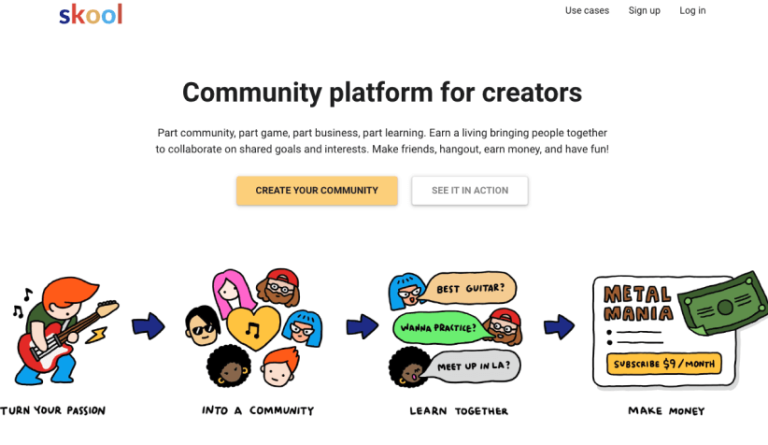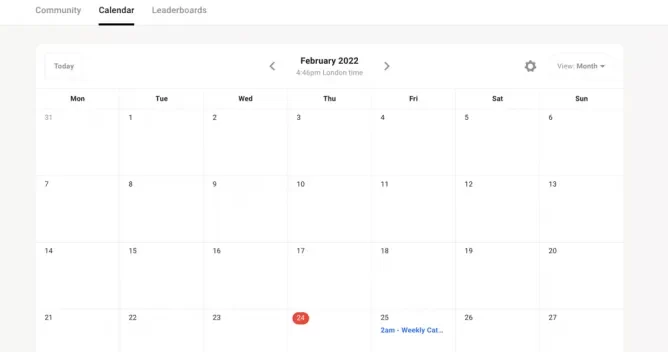Skool is a platform where people build their online community. Today, we are going to share some honest facts about the Skool platform with you. If you’re considering buying a monthly subscription, it’s crucial to know how useful this platform can be. It is specially designed for creators, and it allows them to set up and run their communities and courses.
Deciding to join Skool’s often depends on personal needs. Many get lost in the hype surrounding new internet tools. But it’s essential to take a step back and know exactly what’s best for your business. In this article, we will explore all about Skool,, including its features and pricing, and will also provide a detailed overview.
Quick Summary
Many articles on Skool suggest it’s for everyone, but that’s not true. Skool is a solution mainly for consultants, course creators, YouTubers, educators, course creators, coaches, and those in information businesses. If your line of work doesn’t fit this, it might not be for you. It is ideal for a course creator or entrepreneur, and it helps build trust, boost sales, and engage with your target audience.
Skool works perfectly when it comes to selling courses or subscriptions. If you’re into physical products, though, Skool is not for you. Other platforms could serve you better than Skool.
What is Skool?
Skool is an all-in-one solution for those who run courses and manage an online community. It’s simple to use and replaces the need for separate tools like Teachable, Kajabi, MightNetworks, and Facebook Groups. Everything from your course materials to your event schedule is in one place.
Sam Ovens founded it. It launched in 2019, but it was available in beta version. In early 2022, it became public. This platform offers a community and course hosting service that continues to stay ahead in the digital education space.
Who is Skool for?

As mentioned above, skool is for many kinds of people like coaches, course creators, consultants, educators, or YouTubers; this is for you. It’s a place to teach and gather people in a single, distraction-free community. Here, you have complete control over your content. Unlike other places, Skool.com offers a community that is advertisement-free.
Skool Pros and Cons
Now let’s discuss the pros and cons of using Skool.
Pros
- Unique features: Skool stands out with its community-centered program features.
- Outstanding user experience: It’s easy to learn and navigate.
- Fast-growing platform: Continuously evolving to meet user needs.
Cons
- Features: Lacks video hosting, which is crucial for course creators.
- Price: Some may find it expensive compared to other tools.
- Customer Support: Live chat and direct tech support are not readily available.
Also Read: Kajabi vs Clickfunnels
Skool Features
Now, let’s look at the features in detail.
Community Engagement
Skool is a platform designed to boost vibrant group discussions. It supports various ways for members to interact, like posts, comments, and categories. Users can express themselves through likes, mentions, and by sharing photos, videos, and even GIFs. And these things keep the community engaged and active.
Event Calendar

Skool includes a calendar feature for group events. These events can be scheduled and viewed by everyone. It has automatic timezone adjustments. This makes planning easier. Also, reminder emails are sent to enhance event attendance.
Integrated Classroom
The school integrates courses very well with the community. It offers videos, modules, and other resources. Everything is searchable, including transcripts. Progress tracking is a key feature aiming to boost course completion rates.
Gamification
Skool adds a fun element to learning with its gamification features. Points, levels, and rewards are customizable to make good engagement. By unlocking courses at higher levels, users get more involved in group activities.
Unified Search
Skool makes finding things easy with its search functionality. You can look up posts, course content, members, and comments just by using a single search box. This makes content discovery very easy.
Email Broadcasts
At Skool, you can communicate effortlessly with your members. It lets you broadcast emails with a single click. So because of that there is no need to use complex email setups.
Metrics Dashboard
Skool offers a Metrics Dashboard for tracking your community’s health. It shows key metrics to track things like engagement, growth, and progress. You can see how your group and each member are doing at different levels.
Skool Pricing

Skool’s pricing is very transparent. The cost? Only $99/month for 1 group subscription. This pricing covers access to all Skool features. For courses, you can host as many as you like, there’s no limit. The same goes for members; an unlimited number can join.
If you’re interested in trying this platform but still confused, then Skool offers a 14-day free trial. However, this gives you the flexibility to cancel anytime within the given trial period.
Also Read: Kartra vs Kajabi
Other Tools You Might Need With Skool
Skool covers a lot, but course creators might need more. Apart from Skool’s core functionality, there are other tools that you will need while using Skool. You might need a website and a funnel builder because a good sales page helps you market your courses. Also, an email marketing system is key to getting leads. However, it comes with Zapier integration. It lets you connect the platform to a CRM. When you are planning to buy a school subscription, remember your budget. Adding these tools might cost around $100 a month.
Tips to Get Your Skool Group for Free
So now we have something interesting for you. Creating your group on Skool usually costs money. But there’s a way around it. Skool has an auto affiliate system. If someone from your group creates a new group there, you will receive a 40% commission. And not just once; it’s for life. You will make per month a commission of $39. So, if three people you know create groups, you receive the monthly cost that you have invested. Plus, you earn an extra $18! This system helps users use Skool’s programs without worrying too much about the cost.
Also Read: Thinkific vs Kajabi
Skool Alternatives
Below, we have discussed the free alternatives for Skool.
Skool vs Kajabi
Kajabi is like a multi-tool drawer for course creation and email marketing under one roof. You can host a community there, too. But Skool takes a minimalist philosophy, focusing mainly on community building and course hosting. It prioritizes key areas, which makes the user experience better. Kajabi will cost you 149$ per month, whereas you can get Skool membership for just 99$.
Skool vs. Facebook Group

Facebook groups felt like a letdown after Zuck’s algorithm update. It made it hard for people to keep their groups engaged without paying for reach. Skool tackle these major issues. Unlike Facebook’s confusing interface and distractions, Skool helps you grow your community.
Skool vs Circle
Circle is like your own online island where you can make your community look and work just how you want. It’s easy to change and suits tech people well, especially with its links to other apps like Zapier. They charge $39 a month for up to 1,000 members. Skool is simpler and good for people who make courses or content, costing $99 for as many members as you want. Both Circle and Skool are great for managing big communities in their ways.
Skool Mobile App - iOS and Android Experience
The Skool mobile app brings features that enhance user engagement. Whether you’re on iOS or Android, the experience feels familiar, like the desktop version. With push notifications, group members stay connected. You receive updates that drive more interactions. This has seen a bump in daily active users (DAU).
Skool User Experience Review
Skool stands out in the busy online community-building platforms with its less-is-more approach. It feels like a breath of fresh air in a world where most platforms just add more and more features. Skool is sleek and simple. These qualities help to boost engagement and improve stickiness. This means people stay and keep coming back.
Final Thoughts
Skool is making a big impact on online learning. It combines courses with community features really well, making it more fun and interactive for learners. While it’s not perfect and could get better, its main idea of bringing together learning content and a community is very appealing. For anyone making courses, teaching, or learning online, Skool.com is definitely worth checking out.
FAQ's
Who created Skool.com?
Sam Ovens created Skool.
Is Skool legit?
Yes, Skool, is a legit educational platform.
Does Skool have a free plan?
No, if you want to use Skool, then you have to pay for it. It’s not available in the free version. However, you can start using it free for 14 days.
What platforms does Skool replace?
Skool replaces many platforms like Circle, Teachable, or Kajabi.






